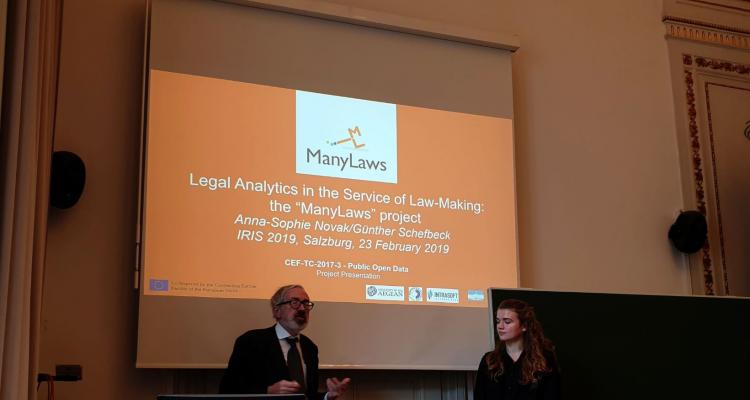The "ManyLaws“ team presented the concept of the project at IRIS, the most eminent legal informatics conference in Central Europe, and used the opportunity to network with other projects in the area of legal analytics. Moreover, the ''ManyLaws'' consortium submission was also nominated for the LexisNexis Best Paper Award 2019.
In the past 22 years, the International Legal Informatics Symposium IRIS in the city of Salzburg, Austria, has become the most important event in the field of legal informatics in Central Europe; once a year it is a meeting venue and exchange hub for professionals from academia, government, business, and civil society interested in keeping track with the most recent developments and trends in legal informatics.
Within the framework of IRIS, there is also a particular focus on electronic law-making. An own session of the respective workshop taking place on 23 February 2019 was devoted to legal analytics and its potential use in the service of law-making. What advantage can law-makers, and all the actors participating in the legislative process, take from legal analytics services? This was the question to be answered by the presentation of the “ManyLaws” concept given by Anna-Sophie Novak from the Danube University Krems and Günther Schefbeck from the Austrian Parliamentary Administration.
The session, beyond that, also provided the opportunity to compare the “ManyLaws” concept with the approach of another EU funded project in legal analytics, i.e. the “Lynx” project presented by Christian Sageder from Openlaws Corporation, both projects found to be similar in their methodical approaches but slightly different in their business perspectives, which seems to be the ideal precondition for closer cooperation, which actually is intended. Finally, Monica Palmirani, professor at the University of Bologna, presented the “LexDatafication” project, which is particularly focusing on the transformation of legacy legal data into a machine processable standard format, as the prerequisite for applying legal analytics algorithms. The recommendation Monica Palmirani made to all legal analytics projects was not to rely on statistical algorithms only but also provide annotation and ontologies taking into account the principles of the theory of law.
As to be concluded from the feedback received in the discussions and informal talks, the session made the audience curious for the analytical services to be developed. Could anything better be said about the success of a presentation?
Last but not least, the ''ManyLaws'' consortium submission to IRIS 2019 was nominated for the LexisNexis Best Paper Award 2019, and came in amongst the top ten best papers, on 21 February 2019 in Salzburg, Austria. The paper, Mining Legislation: An Analysis of the Technical and Legal Implications, sought to answer research questions revolving around the legal and technical implications of mining legislative information. The authors critically analysed existing information systems for storing legal information, and the legal and technical issues associated with mining these systems. They then discussed the technical approaches that could potentially be used to address the identified issues.


